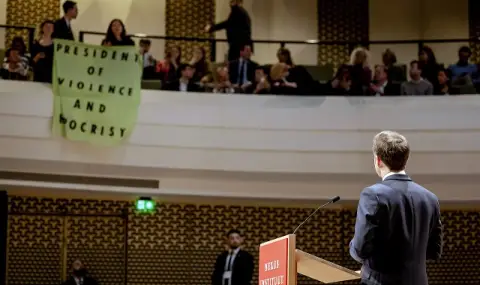Despite some of their electoral successes, the left does not cause any political enthusiasm, says Ivan Krastev in an interview for "De Zeit". In it, he dwells on political radicalism as a new status symbol.
„In some countries such as France and Great Britain, the left managed to achieve surprising successes. But these victories do not cause any intellectual curiosity, any political elation", says the political scientist Ivan Krastev to "Di Zeit". regarding the thesis that recently the right has “usurped" successfully all important topics, and the left or liberals are not given to generate any compelling thoughts. Here is the explanation given by Ivan Krastev for this process:
„Especially the extreme right attracts attention by crossing certain boundaries pushed in post-war times, by violating certain taboos. Things are being said that could not be said before. Nationalism, for example, is no longer an offensive word. Or the claim that the EU is not the solution to European problems - it is itself a problem. The struggle in which the left leads the left everywhere - from the US to France - is a defensive one. The only connecting idea is to prevent the far right".
What attracts the new right
Ivan Krastev points out to “Di Zeit" and the differences between the right of the past and today, which is not simply a copy of the right-wing movements of the period between the two world wars. “The New Right is really new and its refusal to use Nazi symbols is more than cosmetic. It is anti-liberal, it can also be anti-democratic, but it is not some scaled-down copy of fascism - it would be a mistake to lump all parties to the right of the Christian Democrats under one denominator," the Bulgarian political scientist points out in an interview with Mariam Lau. He points out that according to psychologists, no trauma survives more than three generations, and what happened in the 1930s and 1940s is a very distant past for today's young people. “The thrill of breaking a taboo with which nothing connects you anymore - this explains the appeal of the new right, especially for young men," says Krastev.
However, it does not follow that the 1930s will necessarily be repeated, he specifies and names the three main differences: “First of all, the societies then were relatively young, and there were many ex-soldiers in them. Moreover, they were people who had experienced war and violence. Thirdly, they are from a world of complete order - the army with its hierarchy and its chains of command - and suddenly they are faced with the chaos of the post-war era, in which the old social pyramids no longer apply. Respectively, it does not help us to use the concepts from then for the current situation".
Ivan Krastev gives an interview to DVSnimka: DW
Postcolonial Narrative
The Bulgarian political scientist commented to “D Zeit" and the connections between today's right and today's left. “The Left is inspired by the New Right, which in turn owes its identity to the inspiration for the Left. There is also an interesting commonality between them: both the far right and the far left have found success with a postcolonial narrative. The left sees Europe as a colonial power and therefore makes calls like “Free Gaza from German guilt!". For the right, Europeans are “natives", threatened by the “great replacement". The left also faces a difficulty because the new right is often defined by a strong social policy. Let's take for example the Polish "Law and Justice". She governed with classic social democratic policies, reduced social inequality, increased the minimum wage, etc.".
Does it turn out in such a case that the enemy of the new right is no longer the left, but the liberal center, asks Mariam Lau of “De Welt". “This is again similar to the 1930s, when for both extreme trends the fight against the republic was leading. But there is another, demographic aspect. There are many young people among the voters of both the right and the left, men are more likely to have right-wing convictions, women - rather to the left. But unlike in 1968, their votes cannot weigh against others to make a real difference. Therefore, an increasing number of them are turning away from consensus-based politics and moving away from the center. This generation, on the one hand, is progressive in its values. On the other hand, no post-war generation has been so dissatisfied with democracy."
Voters want clear alternatives
Ivan Krastev agrees with the journalist from “De Zeit" that all this stems from the narrowing of the space for political decisions, caused by the ever-increasing legal regulation in liberal democracies. “Voters should be able to make a difference. They want clear alternatives. Generations that have lived through war are very wary of extremes. But people who are young today do not have such traumatic experiences - to them, the former self-limitations seem only to curtail their freedom to make decisions. This points not only to the right. It rather seems to some voters like a kind of labyrinth in which they have fallen, and swing now to one side, then to the other. This is a panicked wandering - there is no way out."
